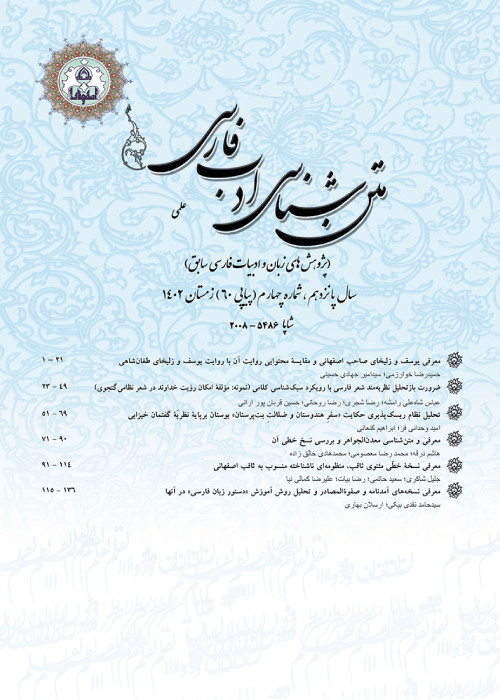The Need to Review and Re-correct Fahahi Heravi’s Divan
Moʼinoddin Farahi Heravi, nicknamed Moʼin/Moʼini, is a poet, artist, jurist, and commentator of the Holy Qur’an in the second half of the ninth century and the beginning of the tenth century AH. The divan attributed to him was corrected in 2016 by Beheshti Shirazi. The purpose of the present study is to review Farahi Heravi’s divan in terms of the quality of correction and authenticity of poems. Unfortunately, due to the inaccuracy and little knowledge of the scribers, the existence of other poets with the nicknam Moin/Moini, the datelessness and recency of the corrected manuscripts, and the lack of precision in proofreading and examining the authenticity of poems attributed to the poet, poems of several poets have found their way into his divan. Such poems are related to the poets before, contemporary, and after him. In this study, an attempt has been made to examine this work in terms of the quality of edit and authenticity of poems. Also, the poems of other poets who have found their way to his divan have been identified. To help the esteemededitor to eliminate the shortcomings of the work and complete the existing shortcomings, a revised and documented text of the poems of this valuable Iranian thinker and a vague corner of Persian poetry of the ninth and tenth centuries are presented.
Moʼinoddin Farahi Heravi, known as Molla Meskin, is an Iranian poet, preacher, jurist, and artist. He was contemporary of Soltan Hossein Bayqara and Amir Alishir Navaʼie. His father-- Sharafoddin Mohammad Farahi-- was also a poet. Although there are Sufi thoughts in his lyric poems, his connection with any Sufi dynasty is not clear. Haji Khalifa in Kashf al-Zonun states that 14 works are attributed to him that apart from Divan, Hadaiq al-Haqaiq and Gesase Musa, only Ma'arej al-Nobowa fi Madarej al-Fotowa, which is the biography of the Prophet Mohammad (PBUH), has been published several times in India. His divan has been published several times in India and Pakistan and once in Iran under the title of Moin Cheshti (d. 633). Another research is the correction of Moʼinoddin Farahi Heravi's Divan by Seyyed Ahmad Beheshti Shirazi, published by Rowzaneh Publications in 2016. Compared to the previous editions of Moʼinoddin Cheshti's Divan, this Divan has 31 exceptions, 31 couplets, 52 fragments, and 66 quatrains, and has not been reprinted after its first edition in recent years. This publication is the basis of the present study.
The present study was done using a library method and written documents of libraries and analyzing their content and comparing them with the contents of Farahi Heravi's divan. An attempt is made to investigate the authenticity of poems attributed to Heravi by referring to authoritative literary and historical texts, memoirs, anthologies, selected poems, recent articles and books related to Farahi Heravi’spoetry and life, tracing his poems in contemporary texts of the poet (before and after the poet's era), the findings of other poets (about 18 poets), as well as corrected mistakes in determining the format of poems and recording some verses with documents.
In this divan, some poems with the inaccuracy of the scribes and incorrect editing are repeated in two different poetic forms. The proofreader has obvious mistakes in correctly recognizing the format of some poems. Moʼinoddin Farahi Heravi's Divan, despite the efforts of the esteemed proofreader, needs to be reviewed and re-edited due to the poems of 18 other poets, so that the poems of other poets are removed from the body of the Divan and the poems are properly placed in special formats. The misprinting Farahi Heravi's poems by Moʼin Cheshti in India and Pakistan, mere corrective adherence to the manuscripts he uses, which are mainly of the late thirteenth and fourteenth centuries AH, failure to trace the poems in manuscripts in other authentic texts, as well as inserting poems from three Farahi Heravi's works (Hadaiq al-Haqaiq, Qesas Musa and Ma'arej al-Nobowa) especially in couplets and quatrains in the Divan can be the reasons for such wrong mixes. Due to the presence of some of Farahi Heravi's poems in other texts, such as the ‘resaleye Akhlage noori’, which do not have the text of the printed divan, it can be said that the present divan does not include all the poet's poems. It has a review, completion, ornamentation, and re-edition.
Farahi Heravi , Divan , Edit , Explanation , Review
- حق عضویت دریافتی صرف حمایت از نشریات عضو و نگهداری، تکمیل و توسعه مگیران میشود.
- پرداخت حق اشتراک و دانلود مقالات اجازه بازنشر آن در سایر رسانههای چاپی و دیجیتال را به کاربر نمیدهد.


